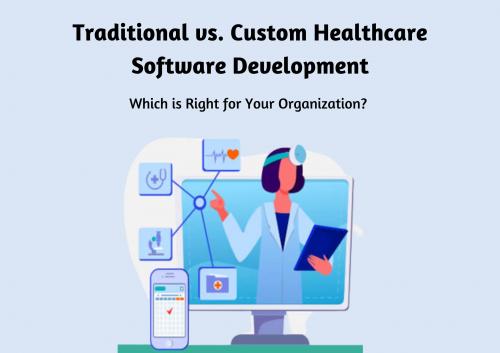Traditional vs. Custom Healthcare Software Development: Which is Right for Your Organization?

Traditional software development
Traditional software development is a structured and linear approach to software development that has been widely used for many years. This approach is often referred to as the "waterfall" model, as it follows a sequential process where each phase of the software development life cycle (SDLC) flows downstream into the next.
Custom Healthcare Software Development
Custom healthcare software development is the process of creating software specifically designed to meet the unique needs of healthcare organizations. Unlike off-the-shelf software, custom healthcare software is built from the ground up to address the specific requirements and workflows of a particular healthcare organization.
Custom healthcare software can be used for a variety of purposes, including electronic medical records (EMRs), remote patient monitoring app, medical billing and coding systems, and clinical decision support systems. By creating software that is tailored to the needs of a particular healthcare organization, custom healthcare software development can help improve efficiency, reduce errors, and improve patient outcomes.
Know the Difference Between Traditional & Custom Healthcare Software Development
The main difference between traditional software development and custom healthcare software development is that custom healthcare software development is specifically designed to meet the unique needs of healthcare organizations, while traditional software development is a more general approach that can be applied to any industry or use case.
Traditional software development typically follows a structured and linear approach to software development, often referred to as the "waterfall" model. This involves a sequential process where each phase of the software development life cycle flows downstream into the next, starting with planning and requirements gathering, moving on to design and implementation, and ending with testing, deployment, and maintenance.
Custom healthcare software development follows a similar process, but with a focus on meeting the specific requirements and workflows of healthcare organizations. This may involve conducting a needs assessment to identify the specific requirements and goals for the software, creating wireframes and technical specifications, and building the software using a variety of programming languages and tools.
Another key difference between traditional software development and custom healthcare software development is the level of regulatory compliance required in healthcare. Healthcare organizations must comply with a variety of regulations, including HIPAA and FDA regulations, which can impact the development and deployment of healthcare software. Custom healthcare software development must take these regulations into account and ensure that the software meets all necessary compliance requirements.
Overall, while traditional software development provides a general approach to software development that can be applied to any industry, custom healthcare software development is specifically designed to meet the unique needs and regulatory requirements of healthcare organizations.
Categories of custom healthcare software
There are several categories of custom healthcare software, each designed to address specific needs within the healthcare industry. Here are some of the main categories:
Electronic Medical Records (EMRs): EMRs are digital versions of patients' medical records, which can be accessed and updated by authorized healthcare providers. Custom EMR software can be tailored to the specific needs of a healthcare app development company, allowing for more efficient and accurate record-keeping.
Practice Management Software: Practice management software is designed to help healthcare providers manCage their administrative tasks, such as scheduling appointments, billing, and insurance claims. Custom practice management software can be designed to meet the specific needs of a healthcare organization, improving efficiency and accuracy.
Post Your Ad Here
Comments